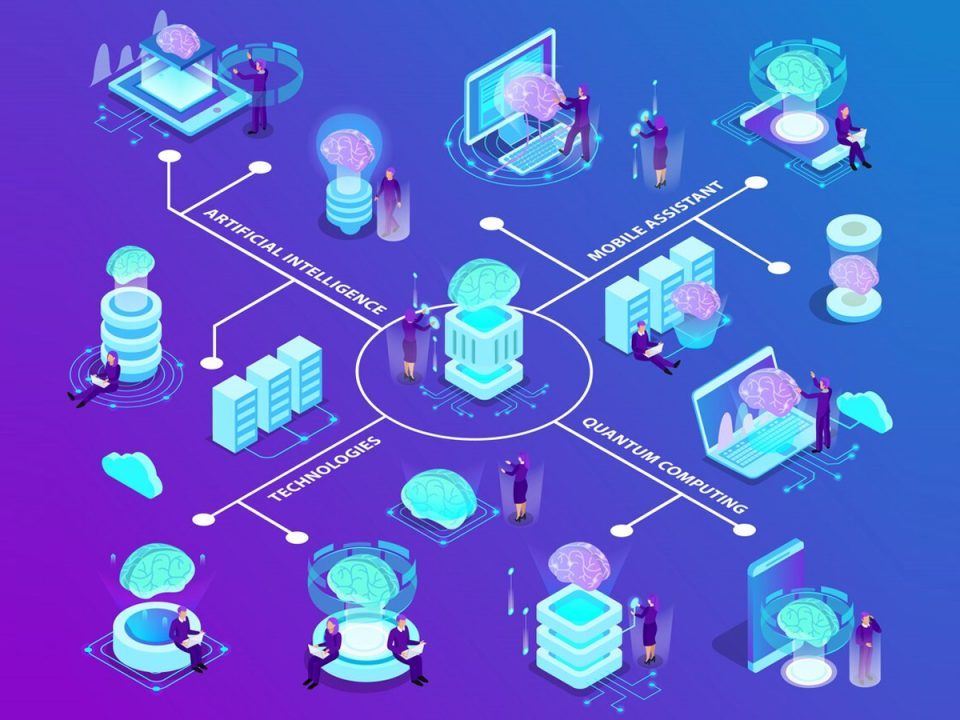Blockchain technology has revolutionized industries by offering decentralized, transparent, and secure solutions for data and transaction management. However, scalability remains one of the most significant challenges, hindering its adoption in high-throughput applications such as financial systems, supply chain management, and IoT ecosystems. This is where the role of AI becomes pivotal, providing innovative solutions to optimize blockchain scalability while maintaining its core principles.
Understanding Blockchain Scalability
Scalability refers to a blockchain’s ability to handle an increasing number of transactions without compromising speed, efficiency, or security. Public blockchains like Bitcoin and Ethereum often face limitations due to their decentralized nature. Key challenges include:
- Transaction Throughput: Limited transactions per second (TPS), which pales compared to traditional systems like Visa or Mastercard.
- Latency: High confirmation times due to consensus mechanisms like Proof of Work (PoW).
- Storage: Growing blockchain size poses challenges for nodes to store and validate historical data.
Addressing these issues requires novel approaches, and AI is emerging as a transformative tool to overcome these limitations.
Catch more Fintech Insights : Global Fintech Interview with David Caruso, Vice President of Financial Crime Compliance at WorkFusion
The Role of AI in Blockchain Scalability
Artificial Intelligence (AI) enhances blockchain scalability by addressing bottlenecks in transaction processing, consensus mechanisms, and resource management. Below are key areas where the role of AI is evident:
- Optimizing Consensus Mechanisms
Consensus algorithms ensure agreement across decentralized networks, but traditional methods like PoW are computationally intensive and slow. AI introduces efficiency by:
- Predictive Modeling: Machine learning models can predict the likelihood of a node acting maliciously, reducing the need for exhaustive consensus checks.
- Adaptive Consensus: AI dynamically adjusts consensus parameters based on network conditions, ensuring faster and more energy-efficient agreement.
- Reinforcement Learning (RL): RL algorithms optimize consensus protocols by learning optimal strategies to reduce latency and resource consumption.
- Enhancing Transaction Throughput
AI improves transaction throughput by optimizing the way transactions are validated and processed:
- Dynamic Sharding: Sharding divides a blockchain into smaller segments (shards) to process transactions in parallel. AI algorithms dynamically allocate shards based on workload predictions, ensuring balanced processing and preventing bottlenecks.
- Transaction Prioritization: AI models analyze transaction patterns and prioritize those critical for the network, improving TPS without overloading the system.
- Reducing Latency with Predictive Analytics
Latency in blockchain occurs due to delays in propagating and confirming transactions. AI reduces latency by:
- Smart Caching: AI predicts frequently accessed data and caches it on nodes, reducing retrieval times.
- Network Optimization: Machine learning identifies bottlenecks in peer-to-peer networks and reroutes traffic for faster data propagation.
- Efficient Storage Management
The ever-growing size of blockchains can overwhelm nodes, leading to scalability issues. AI contributes to efficient storage management through:
- Data Pruning: AI algorithms identify redundant or low-value data for pruning, reducing storage requirements without compromising integrity.
- Compression Algorithms: AI-powered compression techniques optimize data storage, allowing nodes to handle larger blockchains efficiently.
- Off-Chain Solutions: By analyzing transaction data, AI determines which records can be securely stored off-chain without impacting performance.
- Improving Security and Reliability
Scalability often compromises security, but AI ensures a balance by detecting threats in real-time:
- Anomaly Detection: AI-powered tools identify malicious nodes or unusual transaction patterns, preventing network slowdowns.
- Predictive Maintenance: AI predicts hardware or software failures in nodes, ensuring uninterrupted blockchain operations.
AI in Blockchain Scalability: Use Cases
- Decentralized Finance (DeFi)
DeFi platforms rely heavily on blockchain scalability to support high transaction volumes. AI enhances these systems by predicting congestion patterns and adjusting gas fees dynamically to optimize network performance.
- Supply Chain Management
AI ensures seamless scalability in supply chain blockchains by analyzing data flow and optimizing shard allocation based on transactional intensity. This enables real-time tracking without bottlenecks.
- IoT Ecosystems
Blockchain scalability is critical for IoT networks with millions of devices. AI predicts network loads and manages shard configurations to handle IoT-generated data efficiently.
Future Trends and Challenges
The convergence of AI and blockchain is poised to redefine scalability, but challenges remain:
- Computational Overhead: Integrating AI can increase the computational load, requiring more robust infrastructure.
- Interoperability: AI models must adapt to different blockchain frameworks, which can vary in design and protocols.
- Transparency: Ensuring AI decisions align with blockchain’s principles of transparency and auditability is crucial.
Despite these challenges, advancements in AI algorithms, coupled with innovations in blockchain design, promise a scalable future for decentralized technologies.
The role of AI in optimizing blockchain scalability is transformative, addressing critical issues in transaction throughput, consensus efficiency, and storage management. By leveraging AI-driven solutions like dynamic sharding, predictive analytics, and smart caching, blockchain networks can achieve the scalability required for widespread adoption.
Read More on Fintech : Global FinTech Series Interview with Trent Sorbe, Chief Payments Officer at First International Bank and Trust (FIBT)
[To share your insights with us, please write to psen@itechseries.com ]
